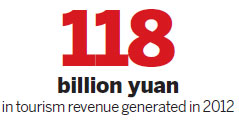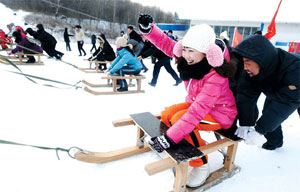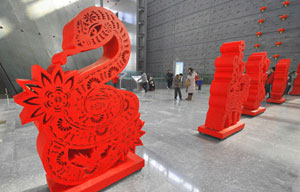Winter tourism picking up in Northeast
Tourism is becoming a major industry in Northeast China's Jilin province, according to official statistics.
Last year, the province received nearly 90 million visitors, and its tourism industry generated 118 billion yuan ($18.9 billion) in revenue.
The figure is likely to reach 145 billion yuan this year, and the number of tourists is projected to surpass 100 million, according to the provincial tourism administration.

"The sector is now in a golden development period and at a key strategic stage for improvement, facing new tasks and demands," said Zhang Wei, deputy chief of the administration.
Last year alone, a combined investment of 21 billion yuan was made in the sector, an increase of 49 percent over 2011. The influx of investment has further improved infrastructure and services and helped to realize the province's goal of becoming a popular tourist destination in Northeast Asia, local officials said.
"Ice and snow is common in Northeast China. Harbin, Jilin, Changchun and the Changbai Mountains are all rich in northern-style tourism resources and have complementary advantages," Zhang said. "Linking them up, we can build a branded tourism route with a typical northeast favor."
For Jilin province, the biggest advantage is snow, according to Zhang. "Our province has fine snow, heavy snowfalls and a longer snow period," he said. "Skiing in Jilin has an absolutely advantage in the country's winter tourism events."
Over years of development, the province has seen fundamental changes in its skiing infrastructure and services at local ski resorts, the official noted.
In addition, health spas and the province's trademark wintry landscapes appeal to tourists, who will be in awe when they see miles of shining tree branches covered with frost, he added.
Local authorities are also developing new winter tourism products in the Changbai Mountains.
The actual temperature on the mountain is even higher than that in the provincial capital Changchun, though people tend to feel colder due to the stronger winds at that altitude, Zhang said.
But visitors need not worry about the chill because they will be shielded by warm rooms and outdoor heating facilities at resorts, the official said.
Moreover, winter tourism is generally related to such sports as skiing, hiking and mountain-climbing. "After sports, you won't feel that cold," he said.
"A health spa surrounded with snow was once a feature only found at some overseas resorts, yet we can make it a reality in the Changbai Mountains now," he said.
Tourism involves an industrial chain covering dining, accommodations, transportation, travel, shopping and entertainment, Zhang said.
"Above everything else, dining is what tourists are concerned about most," he said.
"At the start of this year, we designed a food festival for Chinese New Year's Eve dinner in Jilin, which is expected to promote local customs as a tourism product and attract more travelers to the province for skiing, vacations, spa and the Chinese New Year," he said.
|
| |






















